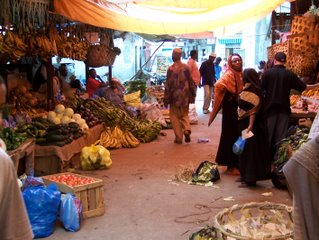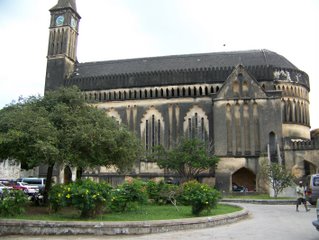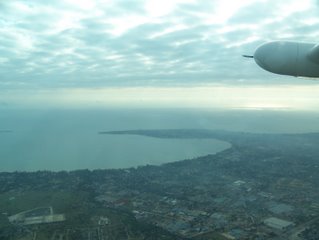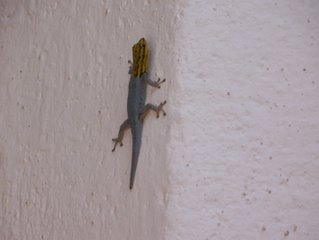
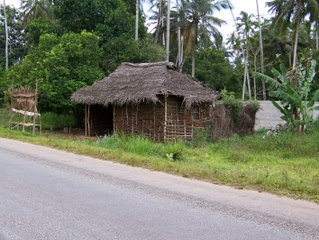




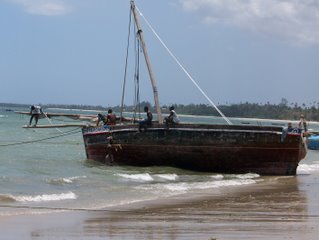

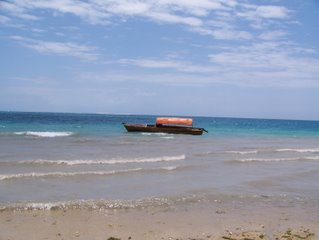


We were supposed to fly to Zanzibar very early last Sunday morning (7.30am take off time). As I was exhausted during most part of my stay in Tanzania, I almost missed my trip to Zanzibar by sleeping through both my alarms … Fortunately, however, I managed to put clothes on and be ready in a few minutes and we arrived at the airport in time to catch our plane.
The flight itself (approximately ½ hour) was incredible, the plane was the tiniest I have ever seen (around 10 seats). We were not even asked to switch off our mobile phones so I left mine on and even exchanged some texts while flying! The view was fantastic – ocean and land, little islands and main land stretching underneath like in a fairy tale.
Our guide was a guy named Jackson who spoke almost perfect English and even told me a few words in Romanian, upon finding out that I am Romanian. He was an independent guide and did strike me as very knowledgeable.
A separate state within Tanzania, Zanzibar consists of two large islands, Unguja (Zanzibar Island) and Pemba, plus several smaller islets. Farming and fishing are the main occupations and most people live in small villages. Cloves are a major export, along with coconut products and other spices. The capital, and by far the largest settlement, is Zanzibar town on the west coast. The population is Muslim in its vast majority; the city having only two churches and over 100 mosques.
In 1840, Sultan Said of Oman relocated his capital in Muscat to Zanzibar. Many Omani Arabs settled on Zanzibar as rulers and landowners, forming an elite group, while Indian settlers formed a merchant class. The island became an Arab state, an important centre of regional politics, and the focus of booming slave trade. Britain had interests in Zanzibar throughout the 19th century; explorers such as Livingstone, Speke and Burton began their expeditions into the African interior from there. In 1890 Zanzibar became a British protectorate.
Zanzibar gained independence from Britain in 1963. In 1964, the sultan was overthrown in a revolution, and nearly all Arabs and Indians were expelled. Later the same year, Zanzibar and Tanganyika combined to form the United Republic of Tanzania.
The first place we were taken to was a small church and a square with a monument where the slaves used to be tied up and flogged in old times, to prove their solid constitution. The monument, made up of several statues in a hole in the ground, was evocative of those times when people were traded as mere commodities.
We were then taken to a local market which was quite an experience for me. I was feeling a bit queasy with exhaustion, sleep deprivation but the market experience almost made me faint. In a very narrow place, lots of people were gathered, traders and customers alike, all kind of fish and other sea food scattered on the ground, and on dirty counters, blood all over the place … I regretted the decision of going inside as soon as I set foot in there but it was already too late … The space was so limited, people dragging huge fish needed to make their way through, so you simply had to keep on moving. I took great pain in avoiding stepping into blood and taking lots of pictures at the same time. Luckily, Jackson spared us the meat section of the market … The rest of the market was interesting as we saw lots and lots of exotic fruits (red bananas was a first for me) and strange vegetables and spices.
We then had a pleasant stroll through Zanzibar’s old quarter, called Stone Town, which is a fascinating maze of narrow streets and alleyways, which lead the visitor past numerous old houses and mosques, ornate palaces, shops and bazaars. Many buildings in the Stone Town date from the 19th century slave boom. Houses reflect their builder’s wealth: Arab houses have plain outer walls and large front doors leading to an inner courtyard; Indian houses have a more open façade and large balconies decorated with railings and balustrades. A striking feature of many houses is the brass-studded doors with their elaborately carved frames. The size of a door and intricacy of its design was an indication of the owner’s wealth and status. The use of studs probably originated in Persia or India, where they helped prevent doors being knocked down by war-elephants. In Zanzibar, studs were purely decorative.
We had lunch in a luxurious restaurant right on the beach. The food was great and the view incredibly beautiful.
In the afternoon, we made a spice tour. This is an organised trip that practically all visitors to Zanzibar undertake. We visited a spice plantation and were shown various spices (incredible smells!!). The ground was extremely muddy and I basically ruined my beautiful Timberland walking shoes but it was well worth it!
A local boy kept manufacturing grass jewellery for us (bracelets, rings, necklaces) and even a kind of exotic bag in the form of a coconut!!
We gave hundreds of tips to everybody but it was all well deserved and I simply fell like giving as much as possible to help the people.
I returned in the evening to the hotel, tired, muddy and full of sweat but so happy and rich inside.
